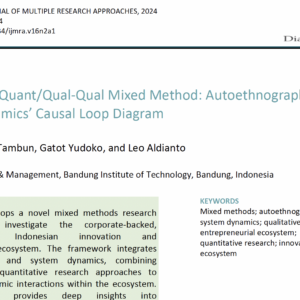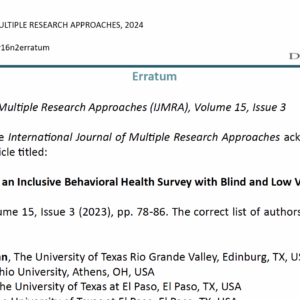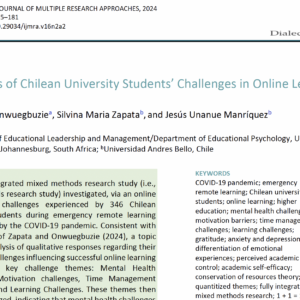16(1). 02. A Call for Integrating Prose and Poetry in Journal Abstracts of Mixed Methods Research Articles
$30.00
Description
Author
Anthony J. Onwuegbuzie
University of Johannesburg, Johannesburg, South Africa and University of South Africa, Pretoria, South Africa
Abstract
As arts-based mixed methods research (Arts-MMR) continues to evolve, the field remains in a nascent stage, with few examples available in the literature (Archibald, 2022). Yet, Arts-MMR holds immense potential for merging arts and mixed methods research within individual studies and broader research programs. Since Archibald’s (2018) pioneering review, several Arts-MMR works have emerged, representing both empirical studies and methodological innovations that offer frameworks for arts-based inquiry. This methodological article advances Arts-MMR through critical dialectical pluralism (CDP), a research philosophy that supports balance between artistic expression and scientific rigor, providing a foundation for future growth in Arts-MMR. To study the world with heart and mind, We blend methods, leaving none behind. Empirical prose presents the way, While poetry asks, “What truths will stay?” This article identifies 39 unique approaches for prose-poetic integration within abstracts, showcasing diverse strategies that unify empirical insight with philosophical reflection. A constant comparison analysis of these abstract types revealed two overarching metathemes and nine themes, with three types aligning closely with both Archibald and Gerber’s (2018) Conceptual Integration Framework and Onwuegbuzie’s (2017) 1 + 1 = 1 Integration Framework. Among these, “Prose for Introducing Real-World Applications, Poetry for Abstract or Philosophical Implications,” as exemplified by the current 333-word abstract, best represents both frameworks, achieving full integration because prose presents practical insights and poetry contemplates their deeper meanings. As prose builds structure, poetry reveals, A layered truth, where intellect feels. The author advocates that journal editors not only permit and encourage such prose-poetic abstracts, but also extend word limits to at least 350 words, allowing these integrative structures the space that they require. The power of this integrative format has inspired the editors-in-chief of the International Journal of Multiple Research Approaches (IJMRA), henceforth, to encourage both poetic abstracts (i.e., consisting only of poetry) and prose-poetic abstracts, expanding the potential for multidimensional research communication. Poetic abstracts, in general, and prose-poetic abstracts, in particular, invite researchers to craft narratives that appeal to both intellect and empathy, bridging rigorous analysis with creative expression.




